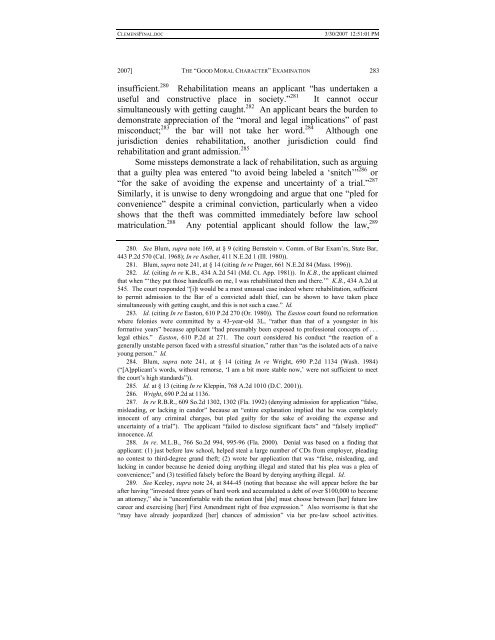Facing the Klieg Lights: Understanding the "Good Moral Character"
Facing the Klieg Lights: Understanding the "Good Moral Character"
Facing the Klieg Lights: Understanding the "Good Moral Character"
You also want an ePaper? Increase the reach of your titles
YUMPU automatically turns print PDFs into web optimized ePapers that Google loves.
CLEMENSFINAL.DOC<br />
3/30/2007 12:51:01 PM<br />
2007] THE “GOOD MORAL CHARACTER” EXAMINATION 283<br />
insufficient. 280 Rehabilitation means an applicant “has undertaken a<br />
useful and constructive place in society.” 281 It cannot occur<br />
simultaneously with getting caught. 282 An applicant bears <strong>the</strong> burden to<br />
demonstrate appreciation of <strong>the</strong> “moral and legal implications” of past<br />
misconduct; 283 <strong>the</strong> bar will not take her word. 284 Although one<br />
jurisdiction denies rehabilitation, ano<strong>the</strong>r jurisdiction could find<br />
rehabilitation and grant admission. 285<br />
Some missteps demonstrate a lack of rehabilitation, such as arguing<br />
that a guilty plea was entered “to avoid being labeled a ‘snitch’” 286 or<br />
“for <strong>the</strong> sake of avoiding <strong>the</strong> expense and uncertainty of a trial.” 287<br />
Similarly, it is unwise to deny wrongdoing and argue that one “pled for<br />
convenience” despite a criminal conviction, particularly when a video<br />
shows that <strong>the</strong> <strong>the</strong>ft was committed immediately before law school<br />
matriculation. 288 Any potential applicant should follow <strong>the</strong> law, 289<br />
280. See Blum, supra note 169, at § 9 (citing Bernstein v. Comm. of Bar Exam’rs, State Bar,<br />
443 P.2d 570 (Cal. 1968); In re Ascher, 411 N.E.2d 1 (Ill. 1980)).<br />
281. Blum, supra note 241, at § 14 (citing In re Prager, 661 N.E.2d 84 (Mass. 1996)).<br />
282. Id. (citing In re K.B., 434 A.2d 541 (Md. Ct. App. 1981)). In K.B., <strong>the</strong> applicant claimed<br />
that when “‘<strong>the</strong>y put those handcuffs on me, I was rehabilitated <strong>the</strong>n and <strong>the</strong>re.’” K.B., 434 A.2d at<br />
545. The court responded “[i]t would be a most unusual case indeed where rehabilitation, sufficient<br />
to permit admission to <strong>the</strong> Bar of a convicted adult thief, can be shown to have taken place<br />
simultaneously with getting caught, and this is not such a case.” Id.<br />
283. Id. (citing In re Easton, 610 P.2d 270 (Or. 1980)). The Easton court found no reformation<br />
where felonies were committed by a 43-year-old 3L, “ra<strong>the</strong>r than that of a youngster in his<br />
formative years” because applicant “had presumably been exposed to professional concepts of . . .<br />
legal ethics.” Easton, 610 P.2d at 271. The court considered his conduct “<strong>the</strong> reaction of a<br />
generally unstable person faced with a stressful situation,” ra<strong>the</strong>r than “as <strong>the</strong> isolated acts of a naive<br />
young person.” Id.<br />
284. Blum, supra note 241, at § 14 (citing In re Wright, 690 P.2d 1134 (Wash. 1984)<br />
(“[A]pplicant’s words, without remorse, ‘I am a bit more stable now,’ were not sufficient to meet<br />
<strong>the</strong> court’s high standards”)).<br />
285. Id. at § 13 (citing In re Kleppin, 768 A.2d 1010 (D.C. 2001)).<br />
286. Wright, 690 P.2d at 1136.<br />
287. In re R.B.R., 609 So.2d 1302, 1302 (Fla. 1992) (denying admission for application “false,<br />
misleading, or lacking in candor” because an “entire explanation implied that he was completely<br />
innocent of any criminal charges, but pled guilty for <strong>the</strong> sake of avoiding <strong>the</strong> expense and<br />
uncertainty of a trial”). The applicant “failed to disclose significant facts” and “falsely implied”<br />
innocence. Id.<br />
288. In re. M.L.B., 766 So.2d 994, 995-96 (Fla. 2000). Denial was based on a finding that<br />
applicant: (1) just before law school, helped steal a large number of CDs from employer, pleading<br />
no contest to third-degree grand <strong>the</strong>ft; (2) wrote bar application that was “false, misleading, and<br />
lacking in candor because he denied doing anything illegal and stated that his plea was a plea of<br />
convenience;” and (3) testified falsely before <strong>the</strong> Board by denying anything illegal. Id.<br />
289. See Keeley, supra note 24, at 844-45 (noting that because she will appear before <strong>the</strong> bar<br />
after having “invested three years of hard work and accumulated a debt of over $100,000 to become<br />
an attorney,” she is “uncomfortable with <strong>the</strong> notion that [she] must choose between [her] future law<br />
career and exercising [her] First Amendment right of free expression.” Also worrisome is that she<br />
“may have already jeopardized [her] chances of admission” via her pre-law school activities.
















